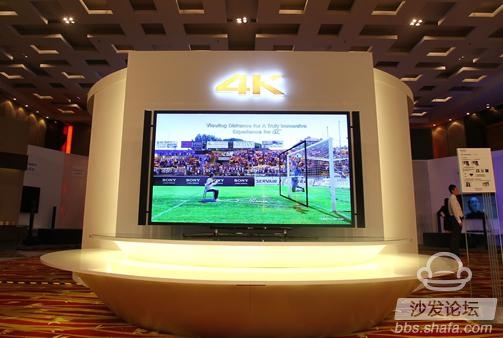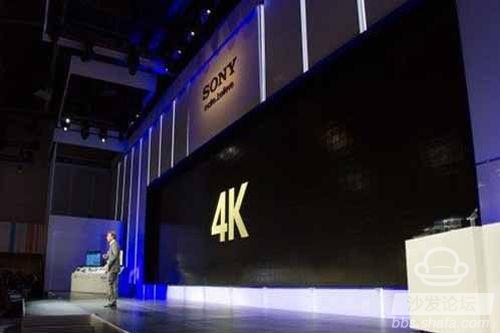The new dispute under the popularization of 4K TV should not prohibit the private film source?
Whether it is in China, the United States, Japan, or Western European countries, the current 4K ultra-high-definition movies, television shows and other film sources are still relatively scarce, which also makes the popularity of 4K ultra-high-definition television in the world's main consumer TV market is facing increasing The contradiction between the number of 4K TV users and the scarcity of 4K sources.
Due to the high production cost, 4K film and TV drama content producers or providers will naturally not be willing to allow users to record private broadcast sources. Especially in countries and regions where the intellectual property system is perfect, pirated 4K movies and TV shows are even more The card was very strict. Compared with high-definition film sources, 4K ultra-high-definition video source broadcast to content producers and producers have greater lethality, because 4K film sources often require a lot of storage space and high broadband speed, at least currently some gold The main type of high-quality customers, these customers in the consumer TV-based consumer market, is a very important profit channel.

At present, the popularity of 4K TVs in the Chinese market is still accelerating, but many users buy home 4K TVs, or broadcast HDTV signals. Occasionally, users will pay for their own 4K Blu-ray discs, which is not a large proportion. What's special about the Chinese market is that consumers who are accustomed to watching free video content want to depend on the popularity of 4K TV hardware, and the difficulty of transitioning from the free age to the past is difficult to imagine.
In the Japanese TV market on the other side, a few years ago, the Japanese color TV industry suffered a major recession and the company suffered huge losses year after year. In order to boost its domestic color TV replacement, Sony, Sharp, Panasonic and other Japanese color TV companies began large-scale promotion of 4K ultra high-definition television.
In particular, Sony has engaged in a unique set of 4K supporting industrial chains around the world, from 4K cameras, 4K cameras, 4K mobile phones, 4K players, to 4K televisions and 4K video productions. With the experience of Sony and the trial launch of 4K radio and TV signals in Japan, Sharp and other Japanese TV companies have also started to equip 4K TVs with 4K Recorder recorders that can record 4K TV programs to attract users' attention and purchase products. .

When the 4K TV market has just started up, the number of users is still relatively small, and the 4K source is not particularly large. The conflict between 4K hardware manufacturers and content providers is not outstanding. However, nowadays, some broadcast TV program operators have begun to broadcast 4K TV signals gradually. In addition, more countries and operators will join 4K television signal transmission and production and broadcast in the future, which makes the contradiction between the two sides begin. deepen.
In Japan, for example, the country’s Broadcasting Bureau has called for bans on hardware makers’ 4K video recorders to privately broadcast 4K clips because it would lead to high-quality pirated film sources flowing to the market. However, manufacturers of 4K video recorders retorted that if users were not allowed to record 4K sources, the convenience of their 4K TVs would be very low, which would not be conducive to market penetration. The arguments are reasonable, because their respective interests are different.

On the one hand, manufacturers of 4K TVs and related peripheral hardware products are in urgent need of more content and sources to attract more users to eliminate old TVs, replace new 4K TVs, and expand the 4K peripheral industry chain. Industry analysts pointed out that from the perspective of user expansion, the promotion power of enterprises is limited. Only the spontaneous 4K content dissemination of consumers can maximise the maximum image quality of 4K TVs. In full bloom, bees and butterflies come.
Today, the Japanese TV brands’ overseas markets have almost disappeared, leaving only their local markets to support them. In Xiao Bian’s view, if Japanese brands do not increase the appeal of content of 4K TV products and consolidate their local market status to preserve this last-minute fruit, then for the Japanese color TV industry that has already been overseas in Japan’s Xishan Xishan, the future may still be China’s and South Korean TV companies have broken their homeland.
On the other hand, content operators are concerned about the issue of ultra-high-definition piracy. After all, the production cost of 4K sources is not cheap. If a 4K video recorder with a hardware manufacturer and a 4K TV with a built-in recording function are used, it is convenient for consumers. However, it has hit the enthusiasm of 4K source makers.
In the Chinese market dominated by free ideas, the principle is that piracy is also not allowed. It is understood that in 2014 Sony had launched a 4K player in China. Sony was cooperating with HUAHUA at that time and also supported 4K content playback on external mobile devices. However, player connections limited Sony Bravia 4K TVs, and other home 4K TVs were not. Must be compatible.
Cooperating with Huadian, naturally, is a legitimate source. The external mobile device must also be a copyrighted resource. That is, the 1080P video source that the user downloads from the personal computer hard disk is generally unrecognizable.
However, even if it is Sony's original genuine 4K film source, viewing the full feature film also requires paid viewing. Due to copyright protection, each 4K movie can only be viewed within 72 hours after download. After this period of validity, you know. It is understood that even if the user copies the downloaded 4K movie to his mobile hard disk within the validity period, the video format is incorrect, and it cannot be played on other 4K broadcast platforms or Sony TV platforms that have passed the expiration date.
For Chinese users who are accustomed to watching movies and watching TV shows for free at home, it is rather unacceptable to spend money and ultimately not be able to save them as permanent, personal, disposable items. After all, watching a movie on their own home TV, 4K TV is bought by oneself, 4K player is bought by oneself, 4K film source is also bought by oneself, and go to the cinema to watch a movie, in addition to the movie ticket is bought by oneself, the others are not There will not be users who will take copies of the film to the cinema.
Therefore, even if a 4K source can be set in a few 4K TVs in 4K TVs, users who have purchased a 4K TV will face a full-scale 4K movie at home and want to watch a full 4K movie at home. It's not an easy task. This explains why users of countries such as Europe, America and Japan, which have complete intellectual property rights, also favor the private recording function of 4K video players.
Due to the high production cost, 4K film and TV drama content producers or providers will naturally not be willing to allow users to record private broadcast sources. Especially in countries and regions where the intellectual property system is perfect, pirated 4K movies and TV shows are even more The card was very strict. Compared with high-definition film sources, 4K ultra-high-definition video source broadcast to content producers and producers have greater lethality, because 4K film sources often require a lot of storage space and high broadband speed, at least currently some gold The main type of high-quality customers, these customers in the consumer TV-based consumer market, is a very important profit channel.

At present, the popularity of 4K TVs in the Chinese market is still accelerating, but many users buy home 4K TVs, or broadcast HDTV signals. Occasionally, users will pay for their own 4K Blu-ray discs, which is not a large proportion. What's special about the Chinese market is that consumers who are accustomed to watching free video content want to depend on the popularity of 4K TV hardware, and the difficulty of transitioning from the free age to the past is difficult to imagine.
In the Japanese TV market on the other side, a few years ago, the Japanese color TV industry suffered a major recession and the company suffered huge losses year after year. In order to boost its domestic color TV replacement, Sony, Sharp, Panasonic and other Japanese color TV companies began large-scale promotion of 4K ultra high-definition television.
In particular, Sony has engaged in a unique set of 4K supporting industrial chains around the world, from 4K cameras, 4K cameras, 4K mobile phones, 4K players, to 4K televisions and 4K video productions. With the experience of Sony and the trial launch of 4K radio and TV signals in Japan, Sharp and other Japanese TV companies have also started to equip 4K TVs with 4K Recorder recorders that can record 4K TV programs to attract users' attention and purchase products. .

When the 4K TV market has just started up, the number of users is still relatively small, and the 4K source is not particularly large. The conflict between 4K hardware manufacturers and content providers is not outstanding. However, nowadays, some broadcast TV program operators have begun to broadcast 4K TV signals gradually. In addition, more countries and operators will join 4K television signal transmission and production and broadcast in the future, which makes the contradiction between the two sides begin. deepen.
In Japan, for example, the country’s Broadcasting Bureau has called for bans on hardware makers’ 4K video recorders to privately broadcast 4K clips because it would lead to high-quality pirated film sources flowing to the market. However, manufacturers of 4K video recorders retorted that if users were not allowed to record 4K sources, the convenience of their 4K TVs would be very low, which would not be conducive to market penetration. The arguments are reasonable, because their respective interests are different.

On the one hand, manufacturers of 4K TVs and related peripheral hardware products are in urgent need of more content and sources to attract more users to eliminate old TVs, replace new 4K TVs, and expand the 4K peripheral industry chain. Industry analysts pointed out that from the perspective of user expansion, the promotion power of enterprises is limited. Only the spontaneous 4K content dissemination of consumers can maximise the maximum image quality of 4K TVs. In full bloom, bees and butterflies come.
Today, the Japanese TV brands’ overseas markets have almost disappeared, leaving only their local markets to support them. In Xiao Bian’s view, if Japanese brands do not increase the appeal of content of 4K TV products and consolidate their local market status to preserve this last-minute fruit, then for the Japanese color TV industry that has already been overseas in Japan’s Xishan Xishan, the future may still be China’s and South Korean TV companies have broken their homeland.
On the other hand, content operators are concerned about the issue of ultra-high-definition piracy. After all, the production cost of 4K sources is not cheap. If a 4K video recorder with a hardware manufacturer and a 4K TV with a built-in recording function are used, it is convenient for consumers. However, it has hit the enthusiasm of 4K source makers.
In the Chinese market dominated by free ideas, the principle is that piracy is also not allowed. It is understood that in 2014 Sony had launched a 4K player in China. Sony was cooperating with HUAHUA at that time and also supported 4K content playback on external mobile devices. However, player connections limited Sony Bravia 4K TVs, and other home 4K TVs were not. Must be compatible.
Cooperating with Huadian, naturally, is a legitimate source. The external mobile device must also be a copyrighted resource. That is, the 1080P video source that the user downloads from the personal computer hard disk is generally unrecognizable.
However, even if it is Sony's original genuine 4K film source, viewing the full feature film also requires paid viewing. Due to copyright protection, each 4K movie can only be viewed within 72 hours after download. After this period of validity, you know. It is understood that even if the user copies the downloaded 4K movie to his mobile hard disk within the validity period, the video format is incorrect, and it cannot be played on other 4K broadcast platforms or Sony TV platforms that have passed the expiration date.
For Chinese users who are accustomed to watching movies and watching TV shows for free at home, it is rather unacceptable to spend money and ultimately not be able to save them as permanent, personal, disposable items. After all, watching a movie on their own home TV, 4K TV is bought by oneself, 4K player is bought by oneself, 4K film source is also bought by oneself, and go to the cinema to watch a movie, in addition to the movie ticket is bought by oneself, the others are not There will not be users who will take copies of the film to the cinema.
Therefore, even if a 4K source can be set in a few 4K TVs in 4K TVs, users who have purchased a 4K TV will face a full-scale 4K movie at home and want to watch a full 4K movie at home. It's not an easy task. This explains why users of countries such as Europe, America and Japan, which have complete intellectual property rights, also favor the private recording function of 4K video players.